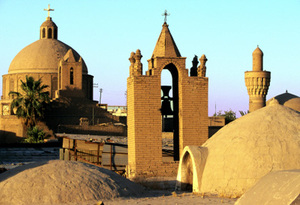The Future of Christians in the Middle East

From Europe Infos: Christian Perspectives on the EU, January 2012.
On 18 and 19 November 2011, a group of MEPs from different European Parliament party groups organised the first top-level parliamentary conference on the theme “The future of Christians in the Middle East.”
Lebanon had been chosen as the host country for this debate because – in the words of His Holiness Pope John-Paul II – “Lebanon is more than a country: it is a message of freedom and an example of pluralism for East and West.”
In the conference discussions, participants from Lebanon, Egypt and Iraq repeatedly expressed their concerns that the “Arab Spring” might end up one day as an “Arab Winter”. In his opening speech, Mgr Beshara al-Rai said, “We fear that they [these changes] may lead to confessional conflicts, the rise of even harsher regimes and a confessional division of the region.” To avoid this risk, “Christians, with all their friends here and elsewhere, must resist all attempts to define our nations and societies in terms of religious identity. We must clearly oppose Islamic exclusivity in the identity of our countries as much as Israel’s Jewishness.”
That is the reason why Christians in the Middle East are lobbying for the idea of the civil state as the solution for their region. “The Civil State, which establishes a separation between religious and political institutions without marginalising the former in public life, seems to provide the framework best suited to the circumstances in our countries.”
What the Middle East Christians do not have is security, basic freedoms or recognition of diversity. Bloody attacks against Christians persist, and freedom of conscience “that is to say, freedom to believe or not to believe, to practise a faith alone or in public without any obstacle, and also the freedom to change faiths is still – except in Lebanon – far from guaranteed in our societies and is sometimes forbidden by law.” The number of Christian members of parliament is also very low.
In these turbulent times, it is absolutely vital that Christians should be the missionaries of an exemplary society reconciled with its plurality, one which shoulders the duty of combating all forms of fundamentalism, fanaticism and xenophobia. Christians in the East are native-born nationals and thus constitute “an inseparable part of the cultural identity of Muslims. The same goes for Muslims in the East, who form an inseparable part of the cultural identity of Christians.”
What does the future hold for Christians in the Middle East? Of course, two days of conference were not long enough to cover this question completely, but they did provide opportunities for participants from both shores of the Mediterranean to forge connections. The reopening of the cathedral in Baghdad, where 58 people had been killed the year before, and the plans for Pope Benedict XVI to visit Lebanon, give further signs of hope to usher in the year 2012.
Fr Piotr Mazurkiewicz
Translated from the Original French